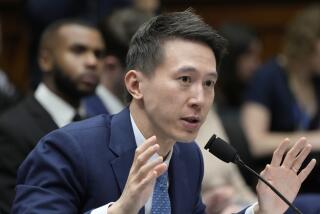Fair Play at Issue in Unocal Bid
WASHINGTON — The proposed buyout of Unocal Corp. by China’s CNOOC Ltd. is dramatizing the complex challenge of devising the rules for a capitalist competition with a communist nation.
Much of the congressional opposition to the attempted acquisition has swirled around questions of whether the links between CNOOC and the Chinese government provide it unfair advantages and whether the company is acting as a commercial competitor or an arm of the Chinese state in pursuing the deal.
The controversy raises what is likely to become an increasing preoccupation of American politics: ensuring a level playing field against China, a growing rival that combines free-market dynamism with lingering government control of the economy.
“It is a system the likes of which we have never seen before because it consists of a combination of communist and free-market practices,” said Alan Tonelson, a research fellow at the U.S. Business and Industry Council, a group of American companies generally skeptical of free trade.
The competition for Unocal, between CNOOC and rival bidder Chevron Corp., is framing the issue in its starkest terms because CNOOC’s parent company, which is fully owned by the Chinese government, is providing its subsidiary with favorable loans to help finance the bid. Although CNOOC says no government money is involved in the acquisition, critics maintain that the below-market financing from China National Offshore Oil Corp. largely explains why the Chinese firm is offering more than Chevron.
No one doubts a political firestorm would erupt if the American government tried to buy a U.S. oil company. In many ways, the question in Washington is whether it should be any more a cause for concern that a firm linked to the Chinese government is trying to buy a U.S. oil company.
Experts disagree on the answer, but converge on one point: With China’s trade surplus allowing it to stockpile foreign reserves, the issues raised in the battle over Unocal are likely to reemerge in future bids for other American companies by firms tied to the Chinese government.
“You can be pretty sure we are going to run into this situation again,” said Kenneth G. Lieberthal, an expert on China issues at the National Security Council under President Clinton. “If it is something that worries us, we ought to have a policy on it.”
Some experts say these conflicts with China are the inevitable result of U.S. policies that have produced large American trade and budget deficits. The former has fattened China’s stockpile of foreign currency; the latter has encouraged China to invest heavily in U.S. Treasury securities sold to finance the government debt.
“We have a financial relationship with the Chinese in which we are dependent on [them] financing a substantial share of our trade and budget deficits,” said I.M. Destler, a trade expert at the University of Maryland. “At some point they are not going to want all their assets in Treasury bills. As long as we are asking them to finance us, to the tune of hundreds of billions a year, it can’t be too shocking they want to put the money in some solid assets as well as some financial assets.”
Yet the prospect of a Chinese firm buying an American oil company has touched a nerve that previous Chinese acquisitions, like the purchase of IBM Corp.’s personal computer business by Lenovo Group Ltd., did not.
Much of the unease in Washington springs from the claim that the Chinese firm is benefiting from the financing.
CNOOC’s parent owns 71% of CNOOC, with the rest owned through publicly traded stock.
To help finance the Unocal deal, the parent company is providing CNOOC with $2.5 billion in interest-free loans and $4.5 billion in a 30-year loan at a below-market interest rate. In addition, CNOOC is receiving a $6-billion loan from a state-owned Chinese bank.
Donald Campbell, a spokesman for Chevron, said the firm believed that preferential financing for CNOOC was worth about $2.6 billion. That’s more than the difference between the Chinese firm’s all-cash $18.5-billion bid and Chevron’s cash and stock offer valued at $16.5 billion.
CNOOC advisors say Chevron’s claim is wildly inflated. A source close to CNOOC who is familiar with the deal, and who asked for anonymity while discussing its internal details, said the firm must repay the interest-free loan from its parent within two years by selling new stock. And the state-owned bank is charging market rates of interest for its loan, the advisor said.
Given these constraints, the source said, the subsidized financing is worth less than a third as much as Chevron claims.
Moreover, said Mark Palmer, the principal U.S. spokesman for CNOOC, the parent was providing the assistance solely because it considered the acquisition a good business deal, not to advance any government policy. CNOOC’s parent has never received any operating subsidies from the Chinese government, he added.
“It is a commercial enterprise and it doesn’t receive any money from the Chinese treasury,” said Palmer, a managing director at lobbying firm Public Strategies Inc.
Those arguments aren’t dissuading the deal’s critics. At a House Armed Services Committee hearing last week, C. Richard D’Amato, chairman of the congressionally chartered U.S.-China Economic and Security Review Commission, charged that without “this generous state-guided credit,” CNOOC “could not possibly offer $18.5 billion for an acquisition of this type.”
Sens. Charles E. Grassley (R-Iowa) and Max Baucus (D-Mont.), the chairman and ranking Democrat on the Senate Finance Committee, last week sent a letter to President Bush saying the CNOOC bid raised the issue of “whether it is appropriate for state-owned enterprises to subsidize investment transactions to acquire scarce natural resources.”
On Tuesday, a bipartisan group of nine senators sent Bush a letter questioning whether a CNOOC purchase of Unocal would enable the Chinese government to influence or manipulate oil prices and supplies, and “whether the proposal is expected to be followed by proposals by other Chinese government owned or controlled entities to acquire other energy assets belonging to United States corporations.”
Other skeptical senators and House members have proposed a mandatory 180-day government economic review of the transaction, which would probably derail CNOOC’s bid.
Many free trade advocates see the concerns about Chinese ownership as misguided.
They note that the national oil company of Venezuela, a country whose relations with the U.S. are also often strained, has owned Citgo Petroleum Corp. for more than a decade without threatening American energy security.
“I’m not sure what the scenario would be in which the Chinese government would use its ownership of Unocal to damage the U.S. economy,” said Jerry Taylor, director of natural resource studies at the libertarian Cato Institute. “We are both net importers of oil ... and for that reason, the Chinese have every incentive to produce.”
Others maintain that the controversy should encourage the U.S. to think more systematically about the economic and security dimensions of competing with China’s hybrid economy.
“That is the kind of system that the U.S. government and U.S. trade law ... have a very difficult time getting their arms around,” Tonelson of the U.S. business group said.
More to Read
Inside the business of entertainment
The Wide Shot brings you news, analysis and insights on everything from streaming wars to production — and what it all means for the future.
You may occasionally receive promotional content from the Los Angeles Times.










